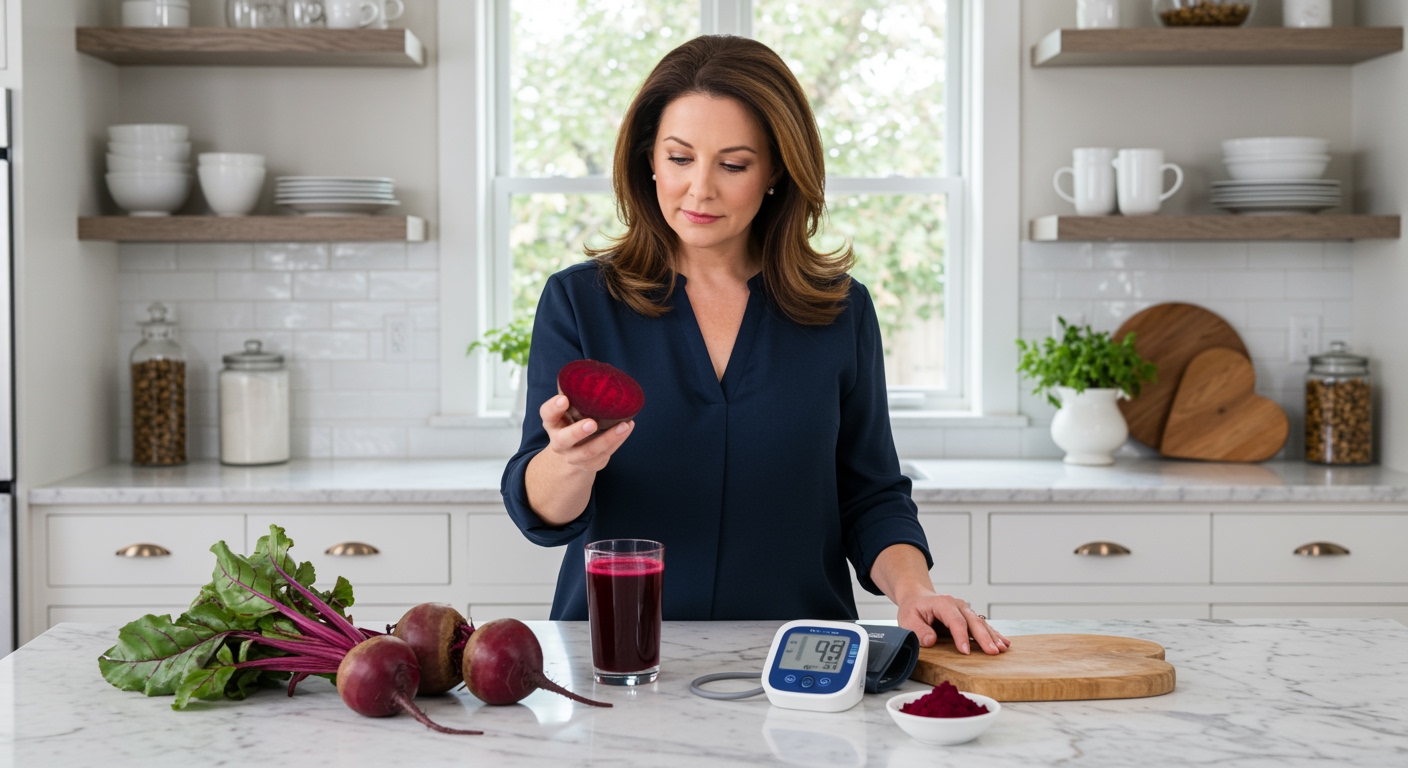✪ Key Takeaway: Beetroot can lower blood pressure, so people with hypotension should consume it carefully and monitor their levels closely.
Introduction
Your doctor just told you that your blood pressure is too low, and now you are wondering about every food choice you make.
You have heard that beetroot is a superfood for heart health, but you are not sure if it will help or hurt your condition.
Hi, I am Abdur, your nutrition coach, and today I am going to explain exactly how beetroot affects low blood pressure and what you need to know before adding it to your diet.
How Does Beetroot Actually Affect Blood Pressure?
Beetroot contains high levels of nitrates, which your body converts into nitric oxide through a fascinating process.
When you eat beetroot, the nitrates travel to your stomach where beneficial bacteria convert them into nitrites.
These nitrites then move into your bloodstream and transform into nitric oxide, a powerful molecule that relaxes your blood vessels.
This relaxation process is called vasodilation, and it allows blood to flow more easily through your arteries and veins.
Research shows that beetroot juice can reduce systolic blood pressure by 4-10 mmHg within just 2-3 hours of consumption.
The effect typically lasts for about 24 hours, which means regular consumption could maintain this blood pressure lowering benefit.
✪ Fact: One cup of beetroot juice contains about 275 mg of nitrates, equivalent to eating two medium-sized beetroots.
What Happens When You Have Low Blood Pressure?
Low blood pressure, or hypotension, occurs when your blood pressure readings consistently fall below 90/60 mmHg.
Your brain, heart, and other vital organs need adequate blood flow to function properly, and low pressure can reduce this circulation.
Common symptoms include dizziness, fatigue, nausea, and fainting spells that can significantly impact your daily life.
Some people naturally have low blood pressure without any symptoms, while others develop it due to medications, dehydration, or underlying health conditions.
The key concern is whether your low blood pressure causes symptoms that interfere with your normal activities and quality of life.
If you experience regular dizziness or fainting, your doctor will likely recommend dietary and lifestyle changes to help raise your blood pressure safely.
✪ Note: Blood pressure naturally varies throughout the day, so one low reading does not necessarily indicate hypotension.
Should You Avoid Beetroot With Low Blood Pressure?
The answer depends on your specific situation and how severe your low blood pressure symptoms are.
If you have asymptomatic low blood pressure and feel perfectly fine, moderate beetroot consumption is unlikely to cause problems.
However, if you experience dizziness, fainting, or other symptoms, beetroot could potentially make these issues worse.
The blood pressure lowering effect of beetroot is temporary and relatively mild, but it could be enough to trigger symptoms in sensitive individuals.
Many people with mild hypotension can still enjoy beetroot occasionally without experiencing negative effects on their blood pressure.
The key is to start with small amounts and monitor how your body responds before making beetroot a regular part of your diet.
✪ Pro Tip: Keep a blood pressure log when trying new foods to track any patterns or changes in your readings.
What Are The Best Ways To Include Beetroot Safely?
If you want to include beetroot in your diet despite having low blood pressure, timing and portion control are crucial.
Start with small amounts, such as a few slices of cooked beetroot or a quarter cup of beetroot juice, and see how you respond.
Consume beetroot earlier in the day when you are more active and less likely to experience dizziness from blood pressure changes.
Cooked beetroot may have a slightly less pronounced effect on blood pressure compared to raw beetroot or concentrated juice.
Always eat beetroot with other foods rather than consuming it alone on an empty stomach to help moderate its effects.
Consider pairing beetroot with foods that naturally support healthy blood pressure, such as foods high in sodium or those that promote hydration.
✪ Fact: Cooking beetroot reduces nitrate content by about 15-20%, making it a gentler option for sensitive individuals.
When Should You Definitely Avoid Beetroot?
There are specific situations where beetroot consumption could be dangerous for people with low blood pressure.
If you take medications for blood pressure or heart conditions, beetroot could interact with these drugs and cause your pressure to drop too low.
People who experience frequent fainting spells or severe dizziness should avoid beetroot until their blood pressure is better controlled.
If you have orthostatic hypotension, where your blood pressure drops when you stand up, beetroot could worsen this condition.
Anyone scheduled for surgery should stop consuming beetroot at least 48 hours beforehand, as it can affect blood pressure during procedures.
Always consult with your healthcare provider before adding beetroot to your diet if you have any cardiovascular conditions or take related medications.
✪ Note: Emergency situations requiring immediate medical attention include severe dizziness, chest pain, or fainting after consuming beetroot.
The Bottom Line
Beetroot can lower blood pressure, which means people with hypotension need to approach it with caution and awareness.
Smart nutrition means understanding how foods affect your unique health situation, not following blanket recommendations.
I would love to hear about your experience with beetroot and blood pressure in the comments below, so please share your thoughts and questions.
References
At NutritionCrown, we use quality and credible sources to ensure our content is accurate and trustworthy. Below are the sources referenced in creating this article:
- PMC: Inorganic nitrate supplementation lowers blood pressure in humans
- Healthline: 9 Impressive Health Benefits of Beets
- Cleveland Clinic: The Health Benefits of Beets
- Medical News Today: What are the benefits of beetroot juice?





